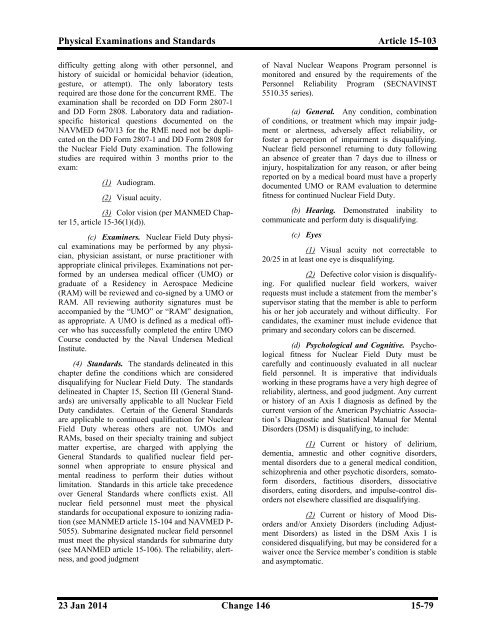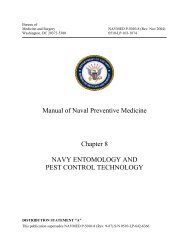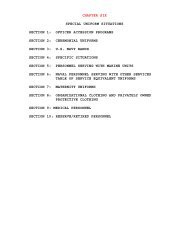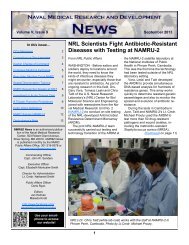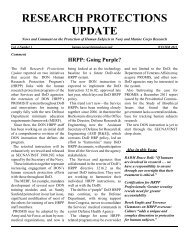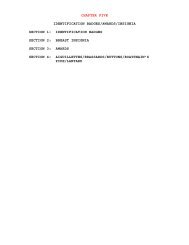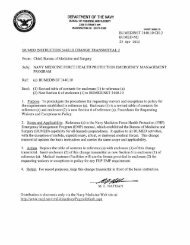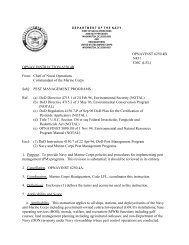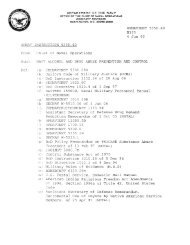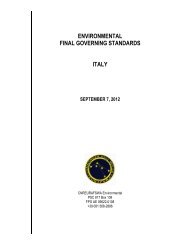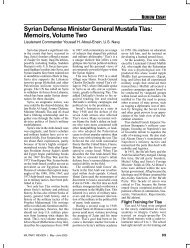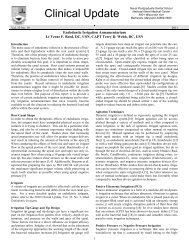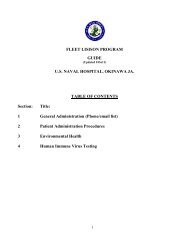Change 146 Manual of the Medical Department ... - Navy Medicine
Change 146 Manual of the Medical Department ... - Navy Medicine
Change 146 Manual of the Medical Department ... - Navy Medicine
Create successful ePaper yourself
Turn your PDF publications into a flip-book with our unique Google optimized e-Paper software.
Physical Examinations and Standards Article 15-103<br />
difficulty getting along with o<strong>the</strong>r personnel, and<br />
history <strong>of</strong> suicidal or homicidal behavior (ideation,<br />
gesture, or attempt). The only laboratory tests<br />
required are those done for <strong>the</strong> concurrent RME. The<br />
examination shall be recorded on DD Form 2807-1<br />
and DD Form 2808. Laboratory data and radiationspecific<br />
historical questions documented on <strong>the</strong><br />
NAVMED 6470/13 for <strong>the</strong> RME need not be duplicated<br />
on <strong>the</strong> DD Form 2807-1 and DD Form 2808 for<br />
<strong>the</strong> Nuclear Field Duty examination. The following<br />
studies are required within 3 months prior to <strong>the</strong><br />
exam:<br />
(1) Audiogram.<br />
(2) Visual acuity.<br />
(3) Color vision (per MANMED Chapter<br />
15, article 15-36(1)(d)).<br />
(c) Examiners. Nuclear Field Duty physical<br />
examinations may be performed by any physician,<br />
physician assistant, or nurse practitioner with<br />
appropriate clinical privileges. Examinations not performed<br />
by an undersea medical <strong>of</strong>ficer (UMO) or<br />
graduate <strong>of</strong> a Residency in Aerospace <strong>Medicine</strong><br />
(RAM) will be reviewed and co-signed by a UMO or<br />
RAM. All reviewing authority signatures must be<br />
accompanied by <strong>the</strong> “UMO” or “RAM” designation,<br />
as appropriate. A UMO is defined as a medical <strong>of</strong>ficer<br />
who has successfully completed <strong>the</strong> entire UMO<br />
Course conducted by <strong>the</strong> Naval Undersea <strong>Medical</strong><br />
Institute.<br />
(4) Standards. The standards delineated in this<br />
chapter define <strong>the</strong> conditions which are considered<br />
disqualifying for Nuclear Field Duty. The standards<br />
delineated in Chapter 15, Section III (General Standards)<br />
are universally applicable to all Nuclear Field<br />
Duty candidates. Certain <strong>of</strong> <strong>the</strong> General Standards<br />
are applicable to continued qualification for Nuclear<br />
Field Duty whereas o<strong>the</strong>rs are not. UMOs and<br />
RAMs, based on <strong>the</strong>ir specialty training and subject<br />
matter expertise, are charged with applying <strong>the</strong><br />
General Standards to qualified nuclear field personnel<br />
when appropriate to ensure physical and<br />
mental readiness to perform <strong>the</strong>ir duties without<br />
limitation. Standards in this article take precedence<br />
over General Standards where conflicts exist. All<br />
nuclear field personnel must meet <strong>the</strong> physical<br />
standards for occupational exposure to ionizing radiation<br />
(see MANMED article 15-104 and NAVMED P-<br />
5055). Submarine designated nuclear field personnel<br />
must meet <strong>the</strong> physical standards for submarine duty<br />
(see MANMED article 15-106). The reliability, alertness,<br />
and good judgment<br />
<strong>of</strong> Naval Nuclear Weapons Program personnel is<br />
monitored and ensured by <strong>the</strong> requirements <strong>of</strong> <strong>the</strong><br />
Personnel Reliability Program (SECNAVINST<br />
5510.35 series).<br />
(a) General. Any condition, combination<br />
<strong>of</strong> conditions, or treatment which may impair judgment<br />
or alertness, adversely affect reliability, or<br />
foster a perception <strong>of</strong> impairment is disqualifying.<br />
Nuclear field personnel returning to duty following<br />
an absence <strong>of</strong> greater than 7 days due to illness or<br />
injury, hospitalization for any reason, or after being<br />
reported on by a medical board must have a properly<br />
documented UMO or RAM evaluation to determine<br />
fitness for continued Nuclear Field Duty.<br />
(b) Hearing. Demonstrated inability to<br />
communicate and perform duty is disqualifying.<br />
(c) Eyes<br />
(1) Visual acuity not correctable to<br />
20/25 in at least one eye is disqualifying.<br />
(2) Defective color vision is disqualifying.<br />
For qualified nuclear field workers, waiver<br />
requests must include a statement from <strong>the</strong> member’s<br />
supervisor stating that <strong>the</strong> member is able to perform<br />
his or her job accurately and without difficulty. For<br />
candidates, <strong>the</strong> examiner must include evidence that<br />
primary and secondary colors can be discerned.<br />
(d) Psychological and Cognitive. Psychological<br />
fitness for Nuclear Field Duty must be<br />
carefully and continuously evaluated in all nuclear<br />
field personnel. It is imperative that individuals<br />
working in <strong>the</strong>se programs have a very high degree <strong>of</strong><br />
reliability, alertness, and good judgment. Any current<br />
or history <strong>of</strong> an Axis I diagnosis as defined by <strong>the</strong><br />
current version <strong>of</strong> <strong>the</strong> American Psychiatric Association’s<br />
Diagnostic and Statistical <strong>Manual</strong> for Mental<br />
Disorders (DSM) is disqualifying, to include:<br />
(1) Current or history <strong>of</strong> delirium,<br />
dementia, amnestic and o<strong>the</strong>r cognitive disorders,<br />
mental disorders due to a general medical condition,<br />
schizophrenia and o<strong>the</strong>r psychotic disorders, somat<strong>of</strong>orm<br />
disorders, factitious disorders, dissociative<br />
disorders, eating disorders, and impulse-control disorders<br />
not elsewhere classified are disqualifying.<br />
(2) Current or history <strong>of</strong> Mood Disorders<br />
and/or Anxiety Disorders (including Adjustment<br />
Disorders) as listed in <strong>the</strong> DSM Axis I is<br />
considered disqualifying, but may be considered for a<br />
waiver once <strong>the</strong> Service member’s condition is stable<br />
and asymptomatic.<br />
23 Jan 2014 <strong>Change</strong> <strong>146</strong> 15-79


